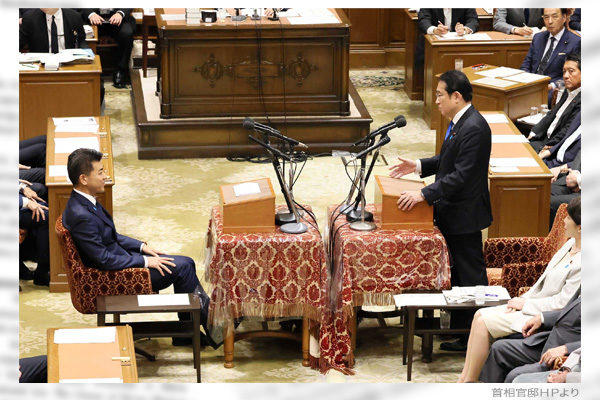The late former Prime Minister Shinzo Abe for whom the second death anniversary is coming soon had reiterated that politicians should have “a passion for delivering results.” Prime Minister Fumio Kishida’s remarks at his debate with opposition party leaders and his press conference indicate that Kishida, while calling for constitutional amendment, has fallen short of taking leadership in realizing it. He critically lacks what Abe described as “passion.”
No action, talk only
Kishida has repeatedly called for constitutional amendment to be realized during his term as president of the ruling Liberal Democratic Party, which will end in September.
“As society has changed drastically, constitutional amendment has become an even more important issue that cannot be postponed,” said Kishida in his video message to a pro-amendment rally on May 3. “If we unnecessarily prolong the discussion without presenting specific amendment options, we may inevitably be criticized for abdicating our responsibility.”
The ordinary session of the National Diet ended on June 23, making it impossible to amend the constitution by September. Nevertheless, Kishida said at a press conference on June 21, “there remain challenges still halfway to the goal: overcoming deflation, political reform, and constitutional amendment,” showing his ambition to seek reelection as LDP president.
At his debate with opposition party leaders on June 19, Kishida criticized the Constitutional Democratic Party as reluctant to discuss constitutional amendment in the Diet, asking CDP leader Kenta Izumi for a responsible approach. Instead of making a request to the CDP, Kishida should have announced the extension of the Diet session. Kishida aides had recommended that the prime minister should extend the Diet session substantially to deal with constitutional amendment. If he tackled constitutional amendment as the LDP’s long-overdue goal, he would have been able to pave the way for his reelection as LDP president.
However, Kishida did not decide on the extension because he did not want opposition parties to grill him at the Diet any more over the issue of “politics and money.” This represents no action, talking only.
Abdication of responsibility
As the Kishida cabinet’s approval rating remains stagnant, if current trend continues, opposition parties including the CDP that has opposed the drafting of constitutional amendments, may increase their seats in the House of Representatives through the next general election, making it difficult for pro-amendment parties to secure a two-thirds majority in the lower house to initiate constitutional amendments for a national referendum. In this sense, Kishida who bears a great deal of responsibility for securing constitutional amendment does not seem to have a shred of regret.
The failure to extend the Diet session has also led to the postponement of the conclusion of consultations between political parties on stable imperial succession that Kishida has attempted to achieve.
No one will trust Kishida who has abdicated his responsibility even if he tries to hold on to power. We hope he will step down as soon as possible.
Takashi Arimoto is a Planning Committee member at the Japan Institute for National Fundamentals and publisher of Monthly Magazine SEIRON at the Sankei Shimbun newspaper.


